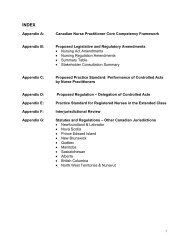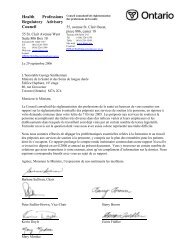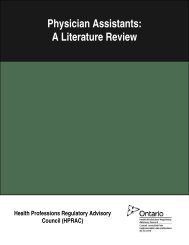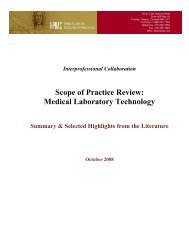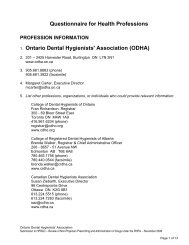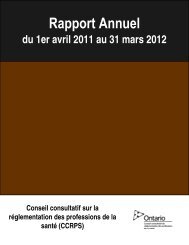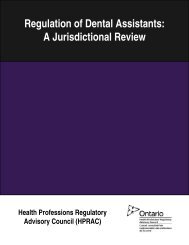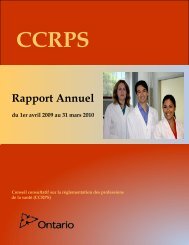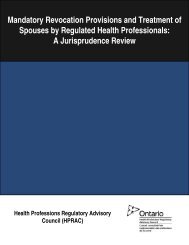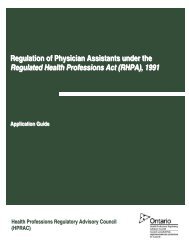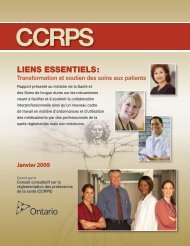- Page 4:
Table of ContentsCritical Links:Tra
- Page 9 and 10:
5Chapter 1 - An Introductionprofess
- Page 11 and 12:
7Chapter 1 - An IntroductionThese r
- Page 13 and 14:
9Chapter 1 - An IntroductionThrough
- Page 16 and 17:
12Chapter 1 - An Introductionreport
- Page 18 and 19:
14Chapter 1 - An Introductiondate.
- Page 20 and 21:
16Chapter 1 - An Introductionprofes
- Page 22 and 23:
18Chapter 1 - An Introductionwithin
- Page 24 and 25:
20Chapter 2 - Excellence in Health
- Page 26 and 27:
22Chapter 2 - Excellence in Health
- Page 28 and 29:
24Chapter 2 - Excellence in Health
- Page 30 and 31:
26Chapter 2 - Excellence in Health
- Page 32 and 33:
28Chapter 2 - Excellence in Health
- Page 34 and 35:
30Chapter 2 - Excellence in Health
- Page 36 and 37:
32Chapter 2 - Excellence in Health
- Page 38 and 39:
34Chapter 2 - Excellence in Health
- Page 40 and 41:
36Chapter 2 - Excellence in Health
- Page 42 and 43:
38Chapter 2 - Excellence in Health
- Page 44 and 45:
40Chapter 2 - Excellence in Health
- Page 46 and 47:
42Chapter 2 - Excellence in Health
- Page 48 and 49:
44Chapter 2 - Excellence in Health
- Page 50 and 51:
46Chapter 2 - Excellence in Health
- Page 52 and 53:
48Chapter 2 - Excellence in Health
- Page 54 and 55:
50Chapter 2 - Excellence in Health
- Page 56 and 57:
52Chapter 2 - Excellence in Health
- Page 58 and 59:
54Chapter 2 - Excellence in Health
- Page 60 and 61:
56Chapter 3 - A New Drug Approvals
- Page 62 and 63:
58Chapter 3 - A New Drug Approvals
- Page 64 and 65:
60Chapter 3 - A New Drug Approvals
- Page 66 and 67:
62Chapter 3 - A New Drug Approvals
- Page 68 and 69:
64Chapter 3 - A New Drug Approvals
- Page 70 and 71:
66Chapter 3 - A New Drug Approvals
- Page 72 and 73:
68Chapter 3 - A New Drug Approvals
- Page 74 and 75:
70Chapter 3 - A New Drug Approvals
- Page 76 and 77:
72Chapter 3 - A New Drug Approvals
- Page 78 and 79:
74Chapter 3 - A New Drug Approvals
- Page 80 and 81:
76Chapter 3 - A New Drug Approvals
- Page 82 and 83:
78Chapter 3 - A New Drug Approvals
- Page 84 and 85:
80Chapter 3 - A New Drug Approvals
- Page 86 and 87:
82Chapter 3 - A New Drug Approvals
- Page 88 and 89:
84Chapter 3 - A New Drug Approvals
- Page 90 and 91:
86Chapter 3 - A New Drug Approvals
- Page 92 and 93:
88Chapter 4 - Critical Links: Propo
- Page 94 and 95:
90Chapter 4 - Critical Links: Propo
- Page 96 and 97:
92Chapter 4 - Critical Links: Propo
- Page 98 and 99:
94Chapter 4 - Critical Links: Propo
- Page 100 and 101:
96Chapter 4 - Critical Links: Propo
- Page 102 and 103:
98Chapter 4 - Critical Links: Propo
- Page 104 and 105:
100Chapter 4 - Critical Links: Prop
- Page 106 and 107:
102Chapter 5 - Scope of Practice of
- Page 108 and 109:
104Chapter 5 - Scope of Practice of
- Page 110 and 111:
106Chapter 5 - Scope of Practice of
- Page 112 and 113:
108Chapter 5 - Scope of Practice of
- Page 114 and 115:
110Chapter 5 - Scope of Practice of
- Page 116 and 117:
112Chapter 5 - Scope of Practice of
- Page 118 and 119:
114Chapter 5 - Scope of Practice of
- Page 120 and 121:
116Chapter 5 - Scope of Practice of
- Page 122 and 123:
118Chapter 5 - Scope of Practice of
- Page 124 and 125:
120Chapter 5 - Scope of Practice of
- Page 126 and 127:
122Chapter 5 - Scope of Practice of
- Page 128 and 129:
124Chapter 5 - Scope of Practice of
- Page 130 and 131:
126Chapter 5 - Scope of Practice of
- Page 132 and 133:
128Chapter 5 - Scope of Practice of
- Page 134 and 135:
130Chapter 6 - Scope of Practice of
- Page 136 and 137:
132Chapter 6 - Scope of Practice of
- Page 138 and 139:
134Chapter 6 - Scope of Practice of
- Page 140 and 141:
136Chapter 6 - Scope of Practice of
- Page 142 and 143:
138Chapter 6 - Scope of Practice of
- Page 144 and 145:
140Chapter 6 - Scope of Practice of
- Page 146 and 147:
142Chapter 6 - Scope of Practice of
- Page 148 and 149:
144Chapter 6 - Scope of Practice of
- Page 150 and 151:
146Chapter 6 - Scope of Practice of
- Page 152 and 153:
148Chapter 6 - Scope of Practice of
- Page 154 and 155:
150Chapter 6 - Scope of Practice of
- Page 156 and 157:
152Chapter 6 - Scope of Practice of
- Page 158 and 159:
154Chapter 6 - Scope of Practice of
- Page 160 and 161:
156Chapter 6 - Scope of Practice of
- Page 162 and 163:
158Chapter 6 - Scope of Practice of
- Page 164 and 165:
160Chapter 6 - Scope of Practice of
- Page 166 and 167:
162Chapter 6 - Scope of Practice of
- Page 168 and 169:
164Chapter 7 - Professions of Chiro
- Page 170 and 171:
166Chapter 7 - Professions of Chiro
- Page 172 and 173:
168Chapter 7 - Professions of Chiro
- Page 174 and 175:
170Chapter 7 - Professions of Chiro
- Page 176 and 177:
172Chapter 7 - Professions of Chiro
- Page 178 and 179:
174Chapter 7 - Professions of Chiro
- Page 180 and 181:
176Chapter 7 - Professions of Chiro
- Page 182 and 183:
178Chapter 7 - Professions of Chiro
- Page 184 and 185:
180Chapter 7 - Professions of Chiro
- Page 186 and 187:
182Chapter 7 - Professions of Chiro
- Page 188 and 189:
184Chapter 7 - Professions of Chiro
- Page 190 and 191:
186Chapter 8 - Profession of Dental
- Page 192 and 193:
188Chapter 8 - Profession of Dental
- Page 194 and 195:
190Chapter 8 - Profession of Dental
- Page 196 and 197:
192Chapter 8 - Profession of Dental
- Page 198 and 199:
194Chapter 8 - Profession of Dental
- Page 200 and 201:
196Chapter 8 - Profession of Dental
- Page 202 and 203:
198Chapter 8 - Profession of Dental
- Page 204 and 205:
200Chapter 8 - Profession of Dental
- Page 206 and 207:
202Chapter 8 - Profession of Dental
- Page 208 and 209:
204Chapter 8 - Profession of Dental
- Page 210 and 211:
206Chapter 8 - Profession of Dental
- Page 212 and 213:
208Chapter 8 - Profession of Dental
- Page 214 and 215:
210Chapter 8 - Profession of Dental
- Page 216 and 217: 212Chapter 8 - Profession of Dental
- Page 218 and 219: 214Chapter 9 - Profession of Dentis
- Page 220 and 221: 216Chapter 9 - Profession of Dentis
- Page 222 and 223: 218Chapter 9 - Profession of Dentis
- Page 224 and 225: 220Chapter 9 - Profession of Dentis
- Page 226 and 227: 222Chapter 9 - Profession of Dentis
- Page 228 and 229: 224Chapter 10 - Profession of Midwi
- Page 230 and 231: 226Chapter 10 - Profession of Midwi
- Page 232 and 233: 228Chapter 10 - Profession of Midwi
- Page 234 and 235: 230Chapter 10 - Profession of Midwi
- Page 236 and 237: 232Chapter 10 - Profession of Midwi
- Page 238 and 239: 234Chapter 10 - Profession of Midwi
- Page 240 and 241: 236Chapter 10 - Profession of Midwi
- Page 242 and 243: 238Chapter 10 - Profession of Midwi
- Page 244 and 245: 240Chapter 10 - Profession of Midwi
- Page 246 and 247: 242Chapter 10 - Profession of Midwi
- Page 248 and 249: 244Chapter 10 - Profession of Midwi
- Page 250 and 251: 246Chapter 10 - Profession of Midwi
- Page 252 and 253: 248Chapter 10 - Profession of Midwi
- Page 254 and 255: 250Chapter 11 - Profession of Natur
- Page 256 and 257: 252Chapter 11 - Profession of Natur
- Page 258 and 259: 254Chapter 11 - Profession of Natur
- Page 260 and 261: 256Chapter 11 - Profession of Natur
- Page 262 and 263: 258Chapter 11 - Profession of Natur
- Page 264 and 265: 260Chapter 11 - Profession of Natur
- Page 268 and 269: 264Chapter 11 - Profession of Natur
- Page 270 and 271: 266Chapter 11 - Profession of Natur
- Page 272 and 273: 268Chapter 11 - Profession of Natur
- Page 274 and 275: 270Chapter 11 - Profession of Natur
- Page 276 and 277: 272Chapter 11 - Profession of Natur
- Page 278 and 279: 274Chapter 12 - Profession of Nursi
- Page 280 and 281: 276Chapter 12 - Profession of Nursi
- Page 282 and 283: 278Chapter 12 - Profession of Nursi
- Page 284 and 285: 280Chapter 12 - Profession of Nursi
- Page 286 and 287: 282Chapter 12 - Profession of Nursi
- Page 288 and 289: 284Chapter 12 - Profession of Nursi
- Page 290 and 291: 286Chapter 12 - Profession of Nursi
- Page 292 and 293: 288Chapter 12 - Profession of Nursi
- Page 294 and 295: 290Chapter 12 - Profession of Nursi
- Page 296 and 297: 292Chapter 12 - Profession of Nursi
- Page 298 and 299: 294Chapter 12 - Profession of Nursi
- Page 300 and 301: 296Chapter 12 - Profession of Nursi
- Page 302 and 303: 298Chapter 12 - Profession of Nursi
- Page 304 and 305: 300Chapter 12 - Profession of Nursi
- Page 306 and 307: 302Chapter 12 - Profession of Nursi
- Page 308 and 309: 304Chapter 12 - Profession of Nursi
- Page 310 and 311: 306Chapter 12 - Profession of Nursi
- Page 312 and 313: 308Chapter 12 - Profession of Nursi
- Page 314 and 315: 310Chapter 13 - Profession of Optom
- Page 316 and 317:
312Chapter 13 - Profession of Optom
- Page 318 and 319:
314Chapter 13 - Profession of Optom
- Page 320 and 321:
316Chapter 13 - Profession of Optom
- Page 322 and 323:
318Chapter 13 - Profession of Optom
- Page 324 and 325:
320Chapter 13 - Profession of Optom
- Page 326 and 327:
322Chapter 13 - Profession of Optom
- Page 328 and 329:
324Chapter 13 - Profession of Optom
- Page 330 and 331:
326Chapter 13 - Profession of Optom
- Page 332 and 333:
328Chapter 13 - Profession of Optom
- Page 334 and 335:
330Chapter 13 - Profession of Optom
- Page 336 and 337:
332Chapter 13 - Profession of Optom
- Page 338 and 339:
334Chapter 13 - Profession of Optom
- Page 340 and 341:
336Chapter 13 - Profession of Optom
- Page 342 and 343:
338Chapter 13 - Profession of Optom
- Page 344 and 345:
340Chapter 14 - Profession of Pharm
- Page 346 and 347:
342Chapter 14 - Profession of Pharm
- Page 348 and 349:
344Chapter 14 - Profession of Pharm
- Page 350 and 351:
346Chapter 14 - Profession of Pharm
- Page 352 and 353:
348Chapter 14 - Profession of Pharm
- Page 354 and 355:
350Chapter 14 - Profession of Pharm
- Page 356 and 357:
352Chapter 14 - Profession of Pharm
- Page 358 and 359:
354Chapter 14 - Profession of Pharm
- Page 360 and 361:
356Chapter 14 - Profession of Pharm
- Page 362 and 363:
358Chapter 14 - Profession of Pharm
- Page 364 and 365:
360Chapter 14 - Profession of Pharm
- Page 366 and 367:
362Chapter 14 - Profession of Pharm
- Page 368 and 369:
364Chapter 14 - Profession of Pharm
- Page 370 and 371:
366Chapter 15 - Profession of Physi
- Page 372 and 373:
368Chapter 15 - Profession of Physi
- Page 374 and 375:
370Chapter 15 - Profession of Physi
- Page 376 and 377:
372Chapter 15 - Profession of Physi
- Page 378 and 379:
374Chapter 15 - Profession of Physi
- Page 380 and 381:
376Chapter 15 - Profession of Physi
- Page 382 and 383:
378Chapter 16 - Profession of Respi
- Page 384 and 385:
380Chapter 16 - Profession of Respi
- Page 386 and 387:
382Chapter 16 - Profession of Respi
- Page 388 and 389:
384Chapter 16 - Profession of Respi
- Page 390 and 391:
386Chapter 16 - Profession of Respi
- Page 392 and 393:
388Chapter 16 - Profession of Respi
- Page 394 and 395:
390Chapter 16 - Profession of Respi
- Page 396 and 397:
392Chapter 16 - Profession of Respi
- Page 398 and 399:
394Chapter 17 - Conclusionscontinui
- Page 400 and 401:
396Chapter 17 - Conclusionsincluded
- Page 402 and 403:
398Chapter 18 - Summary of Proposal
- Page 404 and 405:
400Chapter 18 - Summary of Proposal
- Page 406 and 407:
402Chapter 18 - Summary of Proposal
- Page 408 and 409:
404Chapter 18 - Summary of Proposal
- Page 410 and 411:
406Chapter 18 - Summary of Proposal
- Page 412 and 413:
408Chapter 18 - Summary of Proposal
- Page 414 and 415:
410Chapter 18 - Summary of Proposal
- Page 416 and 417:
412Chapter 18 - Summary of Proposal
- Page 418 and 419:
414Chapter 18 - Summary of Proposal
- Page 420 and 421:
416Chapter 18 - Summary of Proposal
- Page 422 and 423:
418Chapter 18 - Summary of Proposal
- Page 424 and 425:
420Chapter 18 - Summary of Proposal
- Page 426 and 427:
422Chapter 18 - Summary of Proposal
- Page 428 and 429:
424Chapter 18 - Summary of Proposal
- Page 430 and 431:
426Chapter 18 - Summary of Proposal
- Page 432 and 433:
428Chapter 18 - Summary of Proposal
- Page 434 and 435:
430Chapter 18 - Summary of Proposal
- Page 436 and 437:
432Chapter 18 - Summary of Proposal
- Page 438 and 439:
434Chapter 18 - Summary of Proposal
- Page 440 and 441:
436Chapter 18 - Summary of Proposal
- Page 442 and 443:
438Chapter 18 - Summary of Proposal
- Page 444 and 445:
440Chapter 18 - Summary of Proposal
- Page 446 and 447:
442Chapter 18 - Summary of Proposal
- Page 448 and 449:
444Chapter 18 - Summary of Proposal
- Page 450 and 451:
446Chapter 18 - Summary of Proposal
- Page 452 and 453:
448Chapter 18 - Summary of Proposal
- Page 454 and 455:
450Chapter 18 - Summary of Proposal
- Page 456 and 457:
452Chapter 18 - Summary of Proposal
- Page 458 and 459:
454Chapter 18 - Summary of Proposal
- Page 460 and 461:
456Chapter 18 - Summary of Proposal
- Page 462 and 463:
458Chapter 18 - Summary of Proposal



